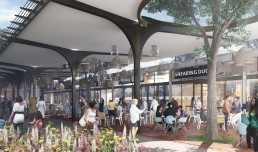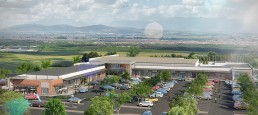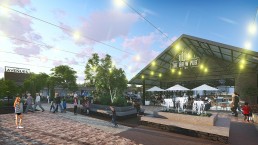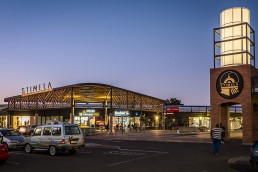This month two local retail centres designed by Boogertman + Partners opened their doors. The Neighbourhood Square in Linksfield, Johannesburg on the 16th of July and Richmond Corner in Montague Gardens in the Western Cape on the 23rd of July.
Reflecting on the design of these centres, which originated roughly two years ago, highlights a trend in the market in which design concepts that were previously evolving at an organic pace have now accelerated and become imperatives in developing pandemic resilient local retail designs. Principles embedded in these retail centres that were ‘nice to have’, such as open retail spaces with natural light and ventilation, one storey ‘piazza-style mall with easy access and ample space for movement are now ‘have to have’ features as people seek retail experiences that make them feel safe and welcome over and above the safety and hygiene protocols put in place by centre management teams.
The Neighbourhood Square, for example, is designed as a boutique retail offering that offers local convenience combined with relaxing outdoor leisure and lifestyle restaurants and interaction spaces as part of the broader Neighbourhood residential precinct masterplan. The urban masterplan guidelines identified and protected older trees around which development took place. As a result, the centre already offers comfortable shaded outdoor dining and coffee spaces. A design adjustment made due to COVID 19 extended the restaurant deck to accommodate more seating and maintain social distancing while enjoying the open-air ambience.
The mandate for property has always been that success is about prime location. This remains a crucial driver, but the importance of easy to access local retail and convenience is heightened during pandemic lockdowns. Richmond Corner backs onto Montague and Atlas Parks, both industrial zones, and is located inland between Milnerton and Bloubergstrand. As it faces the main highway, the N7, that carries Western Cape coastal traffic and, is on the corner of Plattekloof Road which feeds traffic inland, it offers safe, easily accessible convenient retailing. While providing a much-needed service for the broader community it also introduces retail into industrial parks, an often sorely missed offering for users of industrial parks.
What these centres point to is the increasing importance of the role of local retail in the communities they serve. They have become lifestyle destination centres that offer far more than quick convenience and can offer a sense of place and connection for the people who use them and work in them.
Future projects the practice is working on continue this celebration of local access, open-air leisure and connectivity with convenient retail. The Avenues Shopping Centre in Hilton in KZN recognises the importance of the outdoor lifestyle activity typical of the Midlands region. It includes an open-air Amphitheatre that takes advantage of the natural lie of the land. Opportunities are created for weekend markets, art in the park, movie nights, and live performances. Local art & sculpture will play a vital role in the centre, and its garden landscape and the centre will be a welcome community resource where cyclists, hikers, leisure seekers and families can gather outdoors.
Related content
Stimela Crossing Mall plays a fundamental role as a civic square in Barberton
Spatially, the building layout is a hybrid between a traditional open value retail centre- and an enclosed mall and manifests the best of both. It mixes convenience with a market-like experience to promote extended lingering time. Traditional Urban Civic elements, typically not associated with value retail, such as a public piazza and a covered multi-purpose courtyard were introduced to broaden the possibilities of events and promote civic gatherings.
Design the Future, Re-configuring Retail
Retail design and operations are experiencing fundamental change. The impact of COVID-19 has accelerated this. Understanding where new opportunities exist to re-configure and re-think existing retail environments and spaces are required. Adaptation is critical to meet the expectations of the consumer and create safe interactions for retail environments.







